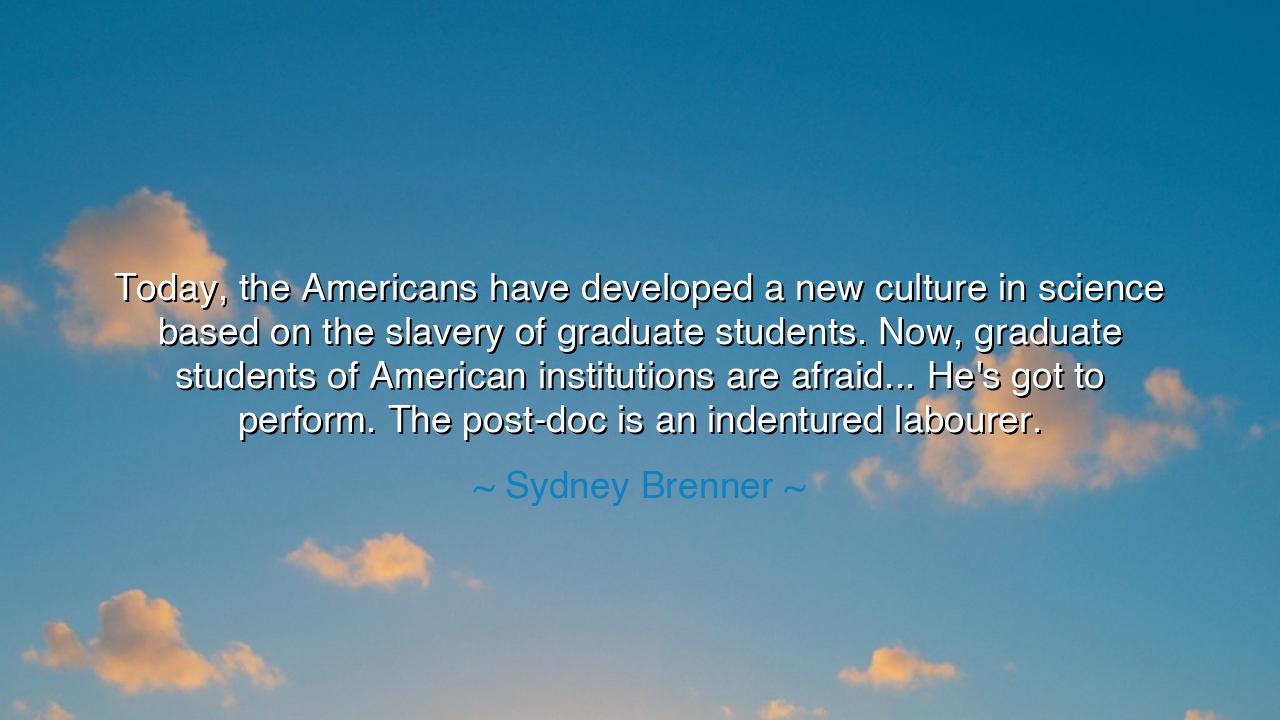
Today, the Americans have developed a new culture in science
Today, the Americans have developed a new culture in science based on the slavery of graduate students. Now, graduate students of American institutions are afraid... He's got to perform. The post-doc is an indentured labourer.






"Today, the Americans have developed a new culture in science based on the slavery of graduate students. Now, graduate students of American institutions are afraid... He's got to perform. The post-doc is an indentured labourer." These words from Sydney Brenner pierce the heart of modern academia, shedding light on a truth that is often ignored in the pursuit of scientific progress. For all the strides humanity has made in knowledge, there are aspects of our academic culture that are built on exploitation and the grinding of individuals into servitude. Brenner’s words remind us that while we race to unlock the secrets of the universe, we must also confront the systems of power and control that exist within the institutions that purport to foster progress.
In the ancient world, knowledge was revered, but it was also a sacred responsibility. Plato and his Academy, for example, sought to cultivate not just intellectuals but philosophers who would guide society toward wisdom and virtue. Students were treated as seekers of truth, nurtured in an environment that valued their well-being as much as their intellectual growth. Even in the shadows of the great libraries of Alexandria, where scholars gathered to uncover the mysteries of the world, the relationship between teacher and student was one of mutual respect, for knowledge was meant to uplift, not to subjugate. The pursuit of wisdom was a communal journey, where each individual’s contribution was valued, and the burden of progress did not fall solely upon the shoulders of the most vulnerable.
Yet, as Brenner so astutely points out, today the pursuit of knowledge in science has become a grueling race in which the graduate student, the very person tasked with carrying the torch of discovery, is often reduced to an indentured laborer, forced to perform under constant pressure, fearful of failure. This culture of fear and subjugation is a far cry from the noble pursuit of wisdom that the ancients so deeply cherished. Graduate students, who are supposed to be nurtured in their intellectual growth, instead find themselves at the mercy of a system that values production and output over human dignity.
Look to the story of Galileo Galilei, who, in the face of relentless opposition from the Church, sought to reveal the truth of the heavens. Galileo did not work alone—he had patrons, supporters, and a team of fellow scholars. Though he himself faced great trials, he understood the importance of collaboration and respect in the pursuit of knowledge. He did not suffer the isolation and fear that modern graduate students face today. Galileo’s journey was one of scientific bravery, yes, but it was also one of human solidarity. His work relied upon the collective effort of many minds working together, not upon the exploitation of the few.
The situation Brenner describes reflects a stark contrast to this ideal. It is a system built on inequality, where the most vulnerable, those at the bottom of the academic hierarchy, bear the heaviest burden. The graduate students and post-docs, who should be the emerging leaders of scientific discovery, are instead forced to toil under the weight of unrealistic expectations, constantly striving to prove their worth to a system that often values results over the well-being of the individual. This culture is not just a failure of the academy, but a failure of society’s understanding of what it means to be truly human in the pursuit of knowledge.
Yet, there is hope. The very fact that Brenner’s words echo through the corridors of time reveals that there are those who still seek justice, still fight for the dignity of the worker and the scholar. The scientific community must begin to recognize that true progress cannot come at the expense of human dignity. The greatest minds in history, from Einstein to Curie, did not rise to greatness alone; they were part of a community, one that nurtured their talents and gave them the space to grow. It is only through fostering a culture of respect and collaboration that we can truly achieve the heights of scientific progress.
In your own life, whether you are a scholar, a worker, or a leader, take Brenner’s words to heart. We must all strive for a world in which the pursuit of knowledge is not a means of exploitation, but a means of collective growth. As leaders, we must recognize that the success of a community depends not only on the talents of its individuals but on the health and well-being of all its members. Just as the great thinkers of the past valued collaboration and mutual respect, so too must we create environments in which the pursuit of truth does not come at the cost of our humanity.
May we remember that science is not a race to be won at any cost, but a journey to be shared, where each individual is valued, nurtured, and respected. Let us build a future where knowledge is a means of empowerment, not exploitation, where the pursuit of truth uplifts us all, and where the dignity of every scholar is honored. This is the true path to progress—one that respects both the mind and the soul.






AAdministratorAdministrator
Welcome, honored guests. Please leave a comment, we will respond soon